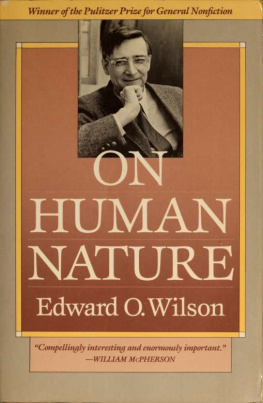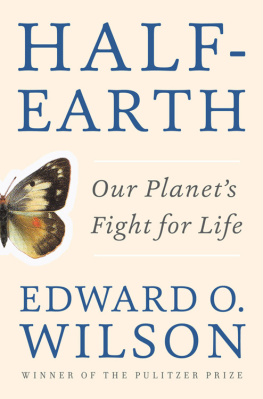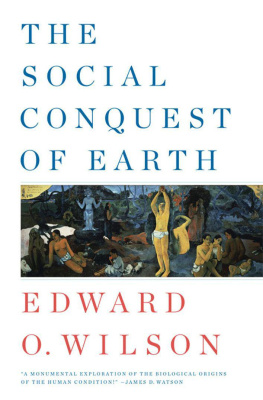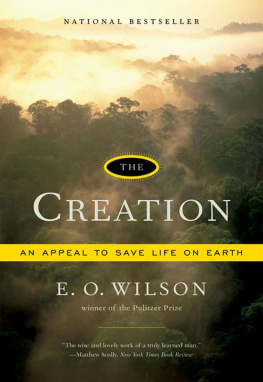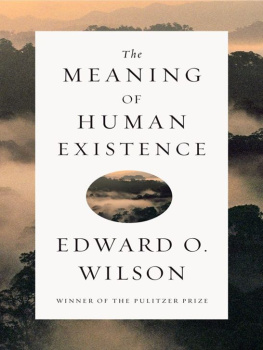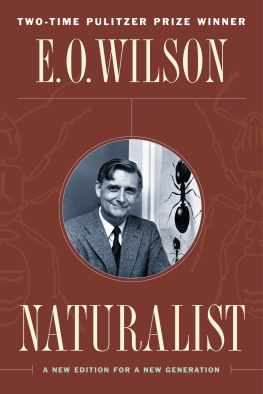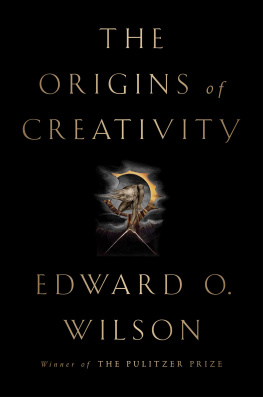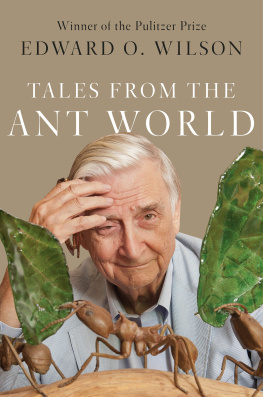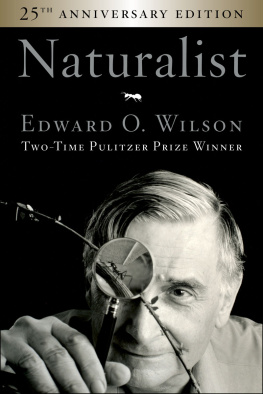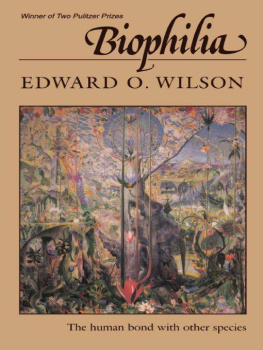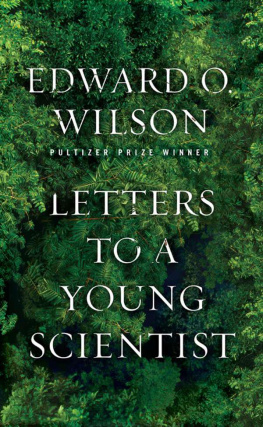Edward O. Wilson - On Human Nature
Here you can read online Edward O. Wilson - On Human Nature full text of the book (entire story) in english for free. Download pdf and epub, get meaning, cover and reviews about this ebook. year: 1979, genre: Romance novel. Description of the work, (preface) as well as reviews are available. Best literature library LitArk.com created for fans of good reading and offers a wide selection of genres:
Romance novel
Science fiction
Adventure
Detective
Science
History
Home and family
Prose
Art
Politics
Computer
Non-fiction
Religion
Business
Children
Humor
Choose a favorite category and find really read worthwhile books. Enjoy immersion in the world of imagination, feel the emotions of the characters or learn something new for yourself, make an fascinating discovery.
- Book:On Human Nature
- Author:
- Genre:
- Year:1979
- Rating:3 / 5
- Favourites:Add to favourites
- Your mark:
- 60
- 1
- 2
- 3
- 4
- 5
On Human Nature: summary, description and annotation
We offer to read an annotation, description, summary or preface (depends on what the author of the book "On Human Nature" wrote himself). If you haven't found the necessary information about the book — write in the comments, we will try to find it.
On Human Nature — read online for free the complete book (whole text) full work
Below is the text of the book, divided by pages. System saving the place of the last page read, allows you to conveniently read the book "On Human Nature" online for free, without having to search again every time where you left off. Put a bookmark, and you can go to the page where you finished reading at any time.
Font size:
Interval:
Bookmark:

This book made available by the Internet Archive.




What chough these reasonings concerning human nature seem abstract and of difficult comprehension, this affords no presumption of their falsehood. On the contrary, it seems impossible that what has hitherto escaped so many wise and profound philosophers can be very obvious and easy. And whatever pains these researches may cost us, we may think ourselves sufficiently rewarded, not only in point of profit but of pleasure, if, by that means, we can make any addition to our stock of knowledge in subjects of such unspeakable importance.
Hume, An Inquiry Concerning Human Understanding

I 2 I CHAPTER 6-. SEX
I 49 CHAPTER 7. ALTRUISM
I 6 9 CHAPTER 8. RELIGION

On Human Nature is the third book in a trilogy that unfolded without my being consciously aware of any logical sequence until it was nearly finished. The final chapter of The Insect Societies (1971) was entitled "The Prospect for a Unified Sociobiology." In it I suggested that the same principles of population biology and comparative zoology that have worked so well in explaining the rigid systems of the social insects could be applied point by point to vertebrate animals. In time, I said, we will account for both termite colonies and troops of rhesus monkeys by a single set of parameters and one quantitative theory. Unable to resist the rhetoric of my own challenge, I set out to learn the large and excellent literature on vertebrate social behavior and wrote Sociobiology: The New Synthesis (1975). In its final chapter "Man: From Sociobiology to Sociology," I argued that the biological principles which now appear to be working reasonably well for animals in general can be extended profitably to the social sciences. This suggestion created an unusual amount of interest and controversy.
The aftermath of the publication of Sociobiology led me to read more widely on human behavior and drew me to many seminars and written exchanges with social scientists. I became more persuaded
On Human Nature
than ever that the time has at last arrived to close the famous gap between the two cultures, and that general sociobiology, which is simply the extension of population biology and evolutionary theory to social organization, is the appropriate instrument for the effort. On Human Nature is an exploration of that thesis.
But this third book could not be a textbook or a conventional synthesis of the scientific literature. To address human behavior systematically is to make a potential topic of every corridor in the labyrinth of the human mind, and hence to consider not just the social sciences but also the humanities, including philosophy and the process of scienrific discovery itself. Consequently, On Human Nature is not a work of science; it is a work about science, and about how far the natural sciences can penetrate into human behavior before they will be transformed into something new. It examines the reciprocal impact that a truly evolutionary explanation of human behavior must have on the social sciences and humanities. On Human Nature may be read for information about behavior and sociobiology, which I have been careful to document. But its core is a speculative essay about the profound consequences that will follow as social theory at long last meets that part of the natural sciences most relevant to it.
Opinion on the merit of these arguments will no doubt be as sharply divided as it was on the sections dealing with human behavior in Sociobiology. At the risk of surrendering advantage to those whose beliefs leave them no option but rejection, I wish to say the following to others who are prone to read this book uncritically as a tested product of science: I might easily be wrongin any particular conclusion, in the grander hopes for the role of the natural sciences, and in the trust gambled on scientific materialism. This qualification does not represent false modest\^ but instead is an attempt to maintain strength. The uncompromising application of evolutionary theory to all aspects of human existence will come to nothing if the scientific spirit itself falters, if ideas are not constructed so as to be submitted
Preface
to objective testing and hence made mortal. The social sciences are still too young and weak, and evolutionary theory itself still too imperfect, for the propositions reviewed here to be carved in stone. It is my conviction nonetheless that the existing evidence favors them and through them the broader confidence in biological inquiry that forms the main thrust of this exposition.
I have been blessed with friends and colleagues who provided enormously useful aid and advice during the preparation of the book. They of course do not agree with everything I have said, and I exonerate them all from the errors that still remain. Their names follow: Richard D. Alexander, Jerome H. Barkow, Daniel Bell, William I. Bennett, Herbert Bloch, William E. Boggs, John T. Bonner, John E. Boswell, Ralph W. Burhoe, Donald T. Campbell, Arthur Caplan, Napoleon A. Chagnon, George A. Clark, Robert K. Colwell, Bernard D. Davis, Irven DeVore, Mildred Dickeman, Robin Fox, Daniel G. Freedman, William D. Hamilton, Richard J. Herm-stein, Bert Holldobler, Gerald Holton, Sarah Blaffer Hrdy, Harry J. Jerison, Mary-Claire King, Melvin Konner, George F. Oster, Orlando Patterson, John E. Pfeiffer, David Premack, W. V. Quine, Jon Seger, Joseph Shepher, B. F. Skinner, Frank Sulloway, Lionel Tiger, Robert L. Trivers, Pierre van den Berghe, Arthur W. Wang, James D. Weinrich, Irene K. Wilson, Richard W. Wrangham.
As she has done for my previous books, Kathleen M. Horton aided in bibliographic research and typed the successive drafts of the manuscript. Her assistance has improved the accuracy and efficiency of my work by an amount I would be afraid to try to measure.
Chapter i contains relatively unchanged portions of my previous articles 'The Social Instinct," Bulletin of the American Academy of Arts and Sciences, 30: 11-24 (1976) and "Biology and the Social Sciences," Daedalus, 106(4): 127-140 (1977); Chapters 5 and 7 contain most of the content of "Human Decency Is Animal" {The New York Times Magazine, October 12, 1975); and Chapters 4 and
xu On Human Nature
8 contain a few sections from Chapter 27 of Sociobiology. The permission of the publishers to reproduce this material is appreciated. Permission for the quotation of work by other authors has been obtained variously from the University of California Press, the University of Chicago Press, and Macmillan Company; the specific citations are given in the bibliographic notes.

Font size:
Interval:
Bookmark:
Similar books «On Human Nature»
Look at similar books to On Human Nature. We have selected literature similar in name and meaning in the hope of providing readers with more options to find new, interesting, not yet read works.
Discussion, reviews of the book On Human Nature and just readers' own opinions. Leave your comments, write what you think about the work, its meaning or the main characters. Specify what exactly you liked and what you didn't like, and why you think so.

